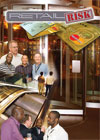

Over 160 delegates gathered in Johannesburg in September for Hi-Tech Security Solutions’ Retail Risk 2010.

Retail Risk 2010 was again a roaring success. Michael Jackson was this year’s master of ceremonies and also the keynote presenter, talking about The Challenge of Change. Can there be anyone in the security industry without an opinion on change? We have seen IP technology growing steadily, traditional guarding functions usurped by technology and an increase in bandwidth availability making remote monitoring a reality for many retailers.

Some change, however, is always welcome. Starting the day, the Consumer Goods Council’s Selma Black offered a short presentation looking at the crime statistics in the retail market over the past year. The good news is that armed robberies have declined. See more on the statistics Black presented in the sidebar 'CGRI Crime Stats' at the bottom of this article.

Jackson’s keynote followed and enthralled the packed audience by looking at the changes the world has experienced since the 1950s. It is no wonder every person is busier than ever and never has time for anything. The world is moving faster, technology is changing everything and social media, still scoffed at by the majority of people in the security industry, is changing the way we interact with each other on a business and social level.
The days of dictating to customers what they want and what they should do is also over. People today trust 'people like me', not government or business. To succeed in a market where your customers have other options as well as independent sources of information about your product or service means you have to talk to them, not at them. It is all about a conversation these days, even in retail. And the pace of change and innovation is continuing to accelerate.
Jackson’s dynamic presentation was an hour of raised eyebrows, laughs and food for thought. While retailers are focused on selling goods off their shelves, they also need to come to terms with the way their customers interact and where they get their information to ensure they keep them coming back.
To find out more about the challenge of change, surf over to www.theothermichaeljackson.com.
You break, you do not buy
Advocate Neville Melville was up next to provide a quick overview of the new Consumer Protection Act that will come into effect next year. The details of the Act are of particular importance to all retailers who solicit and store customers’ personal information. Moreover, it also influences the way in which retailers may deal with customers.

The Act is designed to promote and protect the economic interests of consumers and to empower their decision making with timely access to relevant information. It will also protect them from exploitation and safety hazards, providing an effective means of redress. For example, there will be strict liability rules for defective products sold, even if the sale was concluded in good faith.
The Act states that every consumer has a right to receive goods that:
* Are reasonably suitable for the purposes for which they are generally intended for.
* Are of good quality, in good working order and free of any defects.
* Will be useable and durable for a reasonable period of time.
* Comply with any applicable standards set under the Standards Act.
There are also rules regarding the delivery and return of goods by the consumer. Moreover, the rule regarding misleading marketing will also be tightened.
The Act gives independent consumers access to redress on their own behalf, or on behalf of a group as well as those acting in the public interest. Companies falling short of standards will find themselves in serious trouble, with fines of up to 10% of turnover or R1 million (whichever is greater).
As far as preparing for the implementation of the Act is concerned, Melville recommends the following starting points (but does not end here):
* Understand compliance requirements.
* Prepare procedure manuals, buyer checklists/product compliance and other documentation.
* Review all processes and procedures for compliance.
* Initiate training programmes for all staff.
* Investigate product liability insurance.
To demonstrate the complexity of the Act, Melville has written a book on it. Two delegates won one of these books each. Further information on the book is available at www.madeasy.co.za.
Profiting from IP
Willem Visser now works for AVI, but he was the driving force at Liberty Properties, the company behind the IP surveillance solution installed at Sandton City. Visser explained to the audience what the surveillance problems were at the mall and how IP technologies solved them with examples of the improvement in quality the new system delivered.

Of course, the quality improvements were not simply a result of plonking down IP cameras, but due to the whole solution implemented. Everything, from the network cables was redone, installing a fibre backbone to ensure all future video and audio needs could be accommodated, as well as a data centre to securely record footage.
Moreover, apart from the safety and security benefits the surveillance system delivered, he was able to highlight the potential revenue streams that could be attached to the same systems over time, and the expansion possible to further enhance the value of the system – such as video analytics and two-way conversations.
A further benefit is that the system is ready to be incorporated into a large building management system, which would add the benefits of managing power consumption and life safety issues. The option for integration into current enterprise software packages such as SAP is therefore also available to the Sandton mall if management requires it.
Resistance is futile
Thinking of popping into your local grocer in your unlicensed car? How about using a stolen car to case a store before attempting an armed robbery? That is not unheard of in this country, but now there is a way for the good guys to pre-empt these events.
Fouché Burgers from Business Against Crime spoke on a project using automatic number plate recognition (ANPR) technology and surveillance cameras installed on cars at gated areas, border posts and tollgates. This system scans number plates while on the move, checks the details on a number of databases and acts on the information received. Retailers can use their current surveillance equipment to detect suspicious vehicles as they enter parking areas or complexes. When a vehicle of interest is detected by a retailer, the organisation concerned can react via predetermined processes and alert the police and/or use its security operatives to keep an eye on the vehicle and its occupants.

With 85 000 vehicles stolen or hijacked each year in South Africa, and 50% to 60% of them cloned, reregistered or used in crimes, there are a large number of potentially traceable vehicles illegally on the roads. Burgers says the system developed (and still somewhat under wraps) has an 85% to 95% accuracy rate, being able to scan and check a vehicle in about one second using cellular networks.
Because of the sensitivity of the various databases, the surveillance systems do not have a copy of the data onboard. Cellular and wireless Internet connectivity is used to check and verify the identity of as many vehicles as possible, without inconveniencing law-abiding citizens.
Since the project first started in December 2007, over 10 million records have been checked automatically, which would account for 1 million person-days if a person was to do this manually. In a recent test, 12 000 vehicles were checked in six hours on a Gauteng highway.
Burgers says the best news for retailers about the project is that it does not require a new surveillance solution as it can be integrated with current surveillance technologies in parking areas and entrances. It is also flexible in that is will allow retailers to determine for themselves the appropriate course of action when suspicious vehicles are discovered – such as alerting the police.
For more information on costs, applicability and availability, contact [email protected].
Back to the future
Cash handling is always a stressful topic for retailers as the process of moving cash to and from banks and stores is extremely risky. Armed guards are meant to keep the cash safe, but they are sometimes simply a target for better-armed and organised gangs that have no hesitation in using deadly force to steal the cash.
Debbie Pryer, project manager for Business Against Crime gave the Retail Risk delegates some insight into a new pilot project being rolled out at a shopping centre in Gauteng. This project will see a decrease in the number of armed guards on the site, and hence less temptation for thieves, as the centre moves towards using air tubes and other security devices to move cash between stores and a central secure cash distribution centre. The cash held in the centre will be kept to a minimal as the cash will be recycled immediately, therefore eliminating the need to store cash. Furthermore the retail outlets and banks will move reduced amounts of cash more frequently also resulting in only a minimal amount of cash in their outlets.

This central centre, with the support of the banks will supply and receive cash from the various stores via air tube, cutting out the carrying of cash in public. RF tags will identify each depositor and the receipt of each container will be covered by video surveillance to prevent any collusion. Not only will this strategy reduce the potential for armed attacks, but it also carries financial incentives for all concerned.
Pryer says the implementation of this solution will result in the following benefits for retailers:
* The cost of funds will be reduced.
* The cost of processing will be reduced.
* The cost of CIT will be reduced.
* The cost of expensive security systems in stores will be reduced.
* The cost of guarding will be reduced.
* Investments in dye staining drop safes will be reduced.
* Retailers will receive same day value on all transactions as it is all handled in the mall.
Other potential cost savings can be gained in lower CIT insurance, lower costs due to shortages, and lower in-store insurance and back-office cash costs. In reality, Pryer says the work done on the feasibility study for the pilot project has shown that the potential savings gained by the industry are substantial and the banks also win on the deal by also reducing their CIT costs, funding costs and ATM servicing costs.
For more information, contact [email protected].
A level, quality playing field
Stepping back from technology, Steve Conradie, CEO of the Security Industry Alliance (SIA) offered an insightful presentation on the importance for retailers of using only registered security companies to fulfil their security requirements, whether technical or not.

His presentation may not have included the latest technical solutions, but it hit a nerve with many delegates who are struggling with the services offered to them by 'fly-by-night' service providers who offer cheap services. These companies not only fail to deliver on their mandate and put life and assets at risk, but also give the industry a bad name. Competitors who stick to the rules and deliver a high standard of employee and training often struggle to match the prices of their less ethical foes, while suffering reputational damage when these companies vanish.
Apart from poor service, using unregistered companies makes retailers complicit in the exploitation of employees who are paid a pittance and receive no provident or pension benefits, for example. They also encourage crime as the employees of these companies are not vetted and approved before they are sent on site. And, while they pay less, they are damaging the industry by supporting destructive price competition that only results in worse service.
As a consumer of security services the Private Security Industry Regulation Act (Act 56 of 2001) places an explicit legal onus on consumers of private security services to use only legitimate and registered security service providers. Consumers can be found guilty of a criminal offence and can be prosecuted for intentionally or negligently using the services of a security business which is non-complaint with the Act. Any security service provider has to be registered with PSIRA (Private Security Industry Regulatory Authority). A registration certificate to this effect must be made available on request.
So what does it mean for a security provider to be compliant? Conradie suggests the companies comply with the following:
* They are registered with PSIRA, SARS and pay Workman’s Compensation.
* All security officers are also registered with PSIRA.
* Security officers are paid minimum statutory wages.
* Adherence to the industry code of conduct.
* Security officers are properly trained and members of a provident fund – including the infamous car guards.
The Security Industry Alliance has launched a compliance task team to deal with compliance issues and non-compliant companies. SIA also requested every citizen to ask the questions to ensure that the service providers that they use are indeed compliant and to report non-compliant companies to the SIA office. In addition to this SIA has just launched an industry database which will in time assist with the recruiting of credible and compliant employees. The database is called 'Employment for Life'.
For more information, go to www.securityalliance.co.za .
PINing you down
If the criminals are not skimming your card at restaurants they are putting fake façades onto ATMs (automatic teller machines) and skimming it while copying your PIN (personal identification number). The next time you receive your statement, you will see loads of money has been taken from your account or spent on your credit card, even though the card has been with you all the time.
Susan Potgieter from SABRIC (South African Banking Risk Information Centre) gave a fascinating presentation dealing with the ingenious ways criminals today can extract not only the details on your magnetic banking cards, but also discover your PIN number. It is not always someone looking over your shoulder; criminals today install skimmers and small spy cameras on ATM machines to collect all your information. They do it so well it is very difficult for the untrained eye to detect any problems with the ATM.

Criminals have been known to use cameras, parts of common MP3 players and keyboard overlays, to name a few tricks in their effort to get your card information and PIN number. For those of us using cards regularly, a little vigilance and paranoia is advised.
Potgieter also looked at the statistics of card skimming during the FIFA World Cup. Contrary to the terrifying expectations of a bloodbath, the numbers were lower than expected, in part because of timely action by the police. One senior FIFA official had his card skimmed, but the media never found out so it did not create a fuss. The incidences of skimming for locally issued cards has also declined compared to a year ago, which is good news all around. For more information, got to www.sabric.co.za.
Body language
Dr Craig Donald is renowned for his training of control room operators and offered insight into the importance of employing operators (or training them) to recognise the body language of potential criminals instead of waiting for a crime to happen before reacting. When you know what you’re looking for, it becomes easier to spot planned attacks before they actually happen and take pre-emptive action.

Donald backed up his presentation with a number of videos taken from actual situations in retail environments. While it is not always possible to recognise criminals by what they wear, the videos show that humans give away their intentions by what they do and the way they move. He provided some insight into what should make CCTV operators suspicious.
In one instance, Donald was able to show the stressful movements and actions of a gang of criminals before entering a store. If an operator was to catch these warning signs, action could be taken to move people out of harm’s way and alert the authorities.
He also showed a video of an 'inside job'. The action of the colluding party versus another employee was clearly distinguishable and visible to the camera, even though the resolution would probably not have been accepted in court (which is an unnecessary mistake and a topic for another occasion).
For more information, contact [email protected].
Making the most of technology
MultiVid’s Jan de Beer took the audience on a slightly more technical journey as he highlighted some of the areas retailers need to focus on – in store and in the warehouse environment – if they want to secure their assets effectively. De Beer started by highlighting the many areas of vulnerability in the retail environment, effectively showing that placing a guard or two in a store or warehouse is not going to deliver the security one needs.

Technology is the only way to cover multiple areas of vulnerability cost-effectively, but simply getting your cousin’s friend’s brother to install it is not the way to go either. De Beer highlighted how the right technology, installed correctly and targeted at the appropriate environment can protect retail assets.
He also went into detail concerning the system implementation itself, highlighting the steps the retailer needs to take to ensure the project is installed correctly and to ensure it functions as required for the long term. Poor planning and installation will continue to haunt the customer by making maintenance almost impossible, pushing the total cost of the solution through the roof. For more information, contact [email protected].
Get more from surveillance
Continuing the topic of getting returns on your security investment, Gus Brecher from Cathexis presented on how to get more from your surveillance solution. Brecher noted that any solution involves a number of people in different departments that have their own priorities and goals, which often are not synchronised with the focus of the security manager.

As a starting point, a solution needs buy in from the security manager who is responsible for physical security and safety, the risk manager who is responsible for all other areas of risk, the operational manager, the sales and marketing team as well as the financial manager. A motley crew that is not used to working towards a common goal.
Using a solution Cathexis designed for a large retailer in the UK as a case study, Brecher showed that surveillance solutions should be approached from an holistic point of view that integrated various disparate systems into a single, effective solution. He recommends customers take a hard look at their existing infrastructure, as happened in Visser’s Sandton City presentation and make decisions based on future growth and needs, not the cheapest and quickest solution. Echoing Michael Jackson, Brecher says a solution that will serve the customer well for the long-term may require them to embrace change.
The UK company used as a case study was one of Europe’s largest electronic technology retailers with over R104 billion in annual sales. It boasted 1200 stores that sold an MP3 player every 15 seconds and a flat screen television every 27 seconds. Its distribution centre takes up 100 acres with 180 loading docks and receives 500 deliveries each day.
The solution Cathexis designed included the integration of various aspects of the following systems: megapixel and other cameras, people counting software, EAS (electronic article surveillance), database mining based on information gathered by the system, POS (point-of-sale) SMART analysis, parking systems, access control, time and attendance, fire and alarm solutions, remote offsite monitoring, video analytics and logistics systems.
For more information, contact [email protected].
Surveillance and shopper research
The final presentation for the day was delivered by VideoIQ’s Andrew Page Wood and Peter Wilson from TNS Research Surveys.

Page Wood was promoting the benefits of edge surveillance, noting that traditional systems have bandwidth issues as well as monitoring issues. He says with traditional CCTV camera installations, only about 5% of cameras are monitored and 99% of the surveillance video is redundant. He recommends using cameras with intelligence and storage onboard to reduce the stress on operators and networks, while increasing the benefits gained from IP surveillance. To learn more about intelligent video, browse over to the Intelligent Surveillance webinar, hosted by Hi-Tech Security Solutions and VideoIQ at http://securitysa.com/video.aspx?610hss81_640x480.html.
Wilson followed by presenting some insights into the average shopper in today’s stores. He says 80% of shopping is done in 'beta mode', which is a low-involvement, almost automatic mode. Shopping, it seems is not a highly intellectual activity for most of us.
With 80% of shoppers’ behaviour subconsciously controlled, Wilson suggests that tracking customers’ behaviour throughout the store via surveillance technology can provide insight into how customers buy. This, when combined with the what, why and when data traditional research can deliver, offers useful insights into behaviours that retailers can use to better serve customers and potentially increase their sales per individual.
Page Wood closed by suggesting that existing CCTV systems can now be easily converted into smart research tools. “Because this data is so valuable to retailers and now available real-time, a company’s CCTV system can quickly become a valuable asset while also remaining a security tool.”
For more information, contact [email protected], or [email protected].
Retail exhibitors
Throughout the day, the delegates were also able to mingle with companies that chose to exhibit their retail solutions at Retail Risk 2010. This year’s exhibitors included:
* Innovizion (www.innovizion.co.za).
* SBV Services (www.sbv.co.za).
* Transaction Control Technologies (www.tct.co.za).
* TeleEye (South Africa) (www.TeleEye.co.za).
* Hi-Tech Security Solutions (www.securitysa.com).
CGRI crime stats
Statistics analysed by the Consumer Goods Risk Initiative (CGRI) indicates a significant decrease in armed robbery incidents reported by retail in 2010 when compared to 2008 and 2009.
The total value of loss incurred in armed robberies between 2008 and 2009 increased by R3m, but when considering the footprint grew by 668 stores in 2009, the loss per incident shows the significant impact due to the implementation of effective cash management measures.
Although the analysis of trends such as day of the week and time of day for incidents are pertinent in compilation of best practices and implementation of proactive safety measures, exceptions have to be considered as well.
When considering prevention measures and best practices, one has to bear in mind that there is no silver bullet or a 'one size fit all' solution. Thorough and regular risk assessment is essential, especially after implementation of measures, in order to determine the impact and effectiveness thereof. Setting high standards, optimising existing resources and recognising that counter measures include manpower as well as technology are but some of the considerations. Differentiation between major and minor threats, knowledge of innovative safety measures and regular feedback will guide the approach when considering both proactive and reactive action plans.
Crime prevention is not the sole responsibility of the police and partnerships are a fundamental part of any crime preventions initiative. The exchange of non-competitive information by promoting partnerships between industry role players and other industries affected by crime in order to meaningfully liaise with law enforcement agencies in the identification of patterns, trends and crime prevention strategies to ensure the safety of retail customers is the mission of CGRI.
| Tel: | +27 11 543 5800 |
| Email: | [email protected] |
| www: | www.technews.co.za |
| Articles: | More information and articles about Technews Publishing (SA Instrumentation & Control) |

© Technews Publishing (Pty) Ltd. | All Rights Reserved.